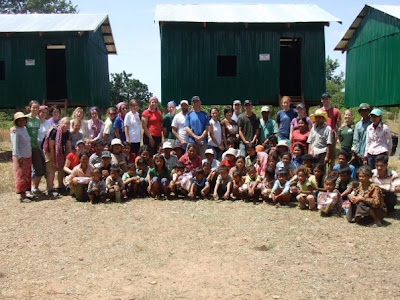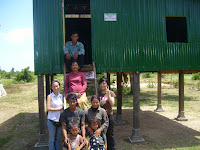
It's been a while since our last update, so here's what's happened so far!
The Spring 2009 semester concluded soon after Cambodia Week, which occurred the week of April 13th, the Cambodian New Year! We had events such as a Sharples Takeover, a showing of the documentary New Year Baby, a Cambodian New Year Party, a Tropical Fruits Parlor Party (people who attended got a whole coconut!), a Tropical Paradise Paces Party, a wasabi eating contest, and
more! Overall, it was quite a succ

ess.
Over the summer of 2009, I (Jen) went to Cambodia for two weeks to visit family (above) and join one of the Tabitha Foundation's housebuilding groups!
I happened to attach to a rather large group; about 25 in all, pictured to the left, along with the homeless families who we built houses for. You can see some of the houses behind us.
The houses aren't much; they amount to some wood held together by nails, sitting on four small stone pillars for support, a silver tin roof, and green tin sides. Our job was to nail the wooden floor in (the easy part), then nail the green tin siding in (not as easy as it seems! In fact, it was downright difficult. Only the two buff farm boys we had could manage to work the entire time). Each house only costs about $1000.
The schedule of a housebuilding group usually runs like this:
Day 1: Group meets up briefly to talk about schedule; get over jet lag
Day 2: Orientation at Tabitha (in Phnom Penh), visit The Killing Fields and Toul Sleng prison (S21)
Day 3: Drive to the build site; we built in Battambang province, which is about a 4-5 hr drive from Phnom Penh
Day 4: Wake up early to build; we built 7 houses in five hours.
Day 5: Finish up the houses; built 3 more, and then had a ceremony to give away the houses. Visit various communities in different stages of development, then head out to Siem Reap
Day 6: Visit temples (Angkor Wat is amazing)
Day 7: Visit more temples, or floating villages, markets, etc
Day 8: Group disbands; head back to Phnom Penh or do whatever you want
As you can see, the housebuilding doesn't take all that long...but what
does last is the impression that the homeless families make on you.

They sit in the shade and watch with hopeful eyes as you steadily nail their house together. Families who have essentially nothing finally have a
home.
The mission of the Tabitha Foundation (and part of SwatCambodia's own mission) is to bring hope to and empower Cambodian families, by teaching them about savings, and helping them realize that their hard work really
can pay off, in the form of finally receiving pots and pans, having the ability to purchase a pig or cow, and to have a roof over their heads. These families don't receive these things for free, but must earn them.
For more information on the Tabitha Foundation, please visit http://www.tabitha-usa.org
To see more of my photos from my trip this summer, visit
http://www.facebook.com/album.php?aid=2022158&id=1464390009&l=65669db427
Feel free to friend me on Facebook :) And join the SwatCambodia Facebook group!
Happy holidays!














